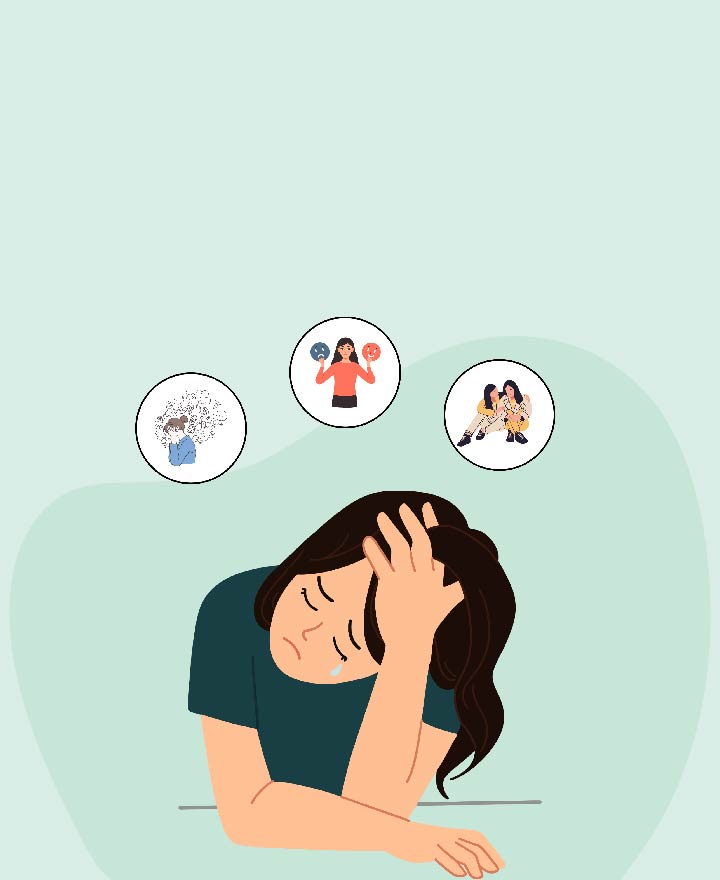

Burnout- Symptoms and Signs You Shouldn’t Ignore
Burnout is an advanced state of physical, emotional, and mental exhaustion brought about by prolonged stress. It tends to progress in stages, beginning with overwork and culminating in a total shutdown. Burnout can affect anyone, particularly those in high-stress positions. Early recognition of symptoms and adjustment of rest, reflection and boundary-setting can potentially minimise its effect. Continue reading to learn more about burnout, its symptoms, and treatment options.
What Is Burnout?
Burnout is a condition of complete physical, mental and emotional exhaustion. It can occur when you are subjected to stress over a prolonged period, particularly from your work or caregiving responsibilities. Burnout victims are usually drained, lack motivation and feel disconnected from their tasks. Unlike ordinary tiredness, burnout doesn’t simply go away with rest. It builds over time and needs deliberate intervention. In such cases, having health insurance can ease access to the support and care needed during recovery.
Types of Burnout
Burnout can manifest in several forms, based on the reason and scenario. Listed below are the four most typical types:
1. Overload burnout
This occurs when you load yourself beyond what you can manage. You may try too hard, frequently disregarding indications of stress. Eventually, this can cause you to become exhausted, frustrated and ill.
2. Under-challenged burnout
This type occurs when you feel bored or unfulfilled. Your work may feel meaningless or too easy, and you may start to lose interest and motivation. Over time, this lack of stimulation may lead to disengagement and loss of purpose.
3. Neglect burnout
In this category, you might feel helpless or hopeless. You might think your efforts are not making any difference and cease to make an effort. This tends to result in poor self-esteem and a lack of confidence.
Stages
Burnout builds in stages. Knowing these stages may assist you in being able to recognise the signs early:
Stage 1: Honeymoon Phase:
You feel excited and energised after starting something new, like a job or course. You are motivated, productive and ready to take on challenges.
Stage 2: Onset of Stress:
As responsibilities increase, stress starts to build. You may sleep less, feel anxious and find it harder to focus.
Stage 3: Chronic Stress:
Stress becomes a regular part of your routine. You feel tired most of the time, start avoiding people and may rely on unhealthy coping habits.
Stage 4: Burnout:
You begin to experience burnout symptoms like constant fatigue, self-doubt and physical issues such as headaches or stomach problems.
Stage 5: Habitual Burnout:
The exhaustion becomes ongoing. You feel mentally and physically drained, and sadness or even depression may set in.
Causes
There are numerous causes as to why burnout can occur. These are some of the most frequent causes:
1. Excessive workload:
Ongoing tasks with insufficient time to unwind or recuperate.
2. Lack of control:
Perceiving a lack of power in decision-making or day-to-day work.
3. Unclear expectations:
Not knowing what is expected can lead to confusion, stress and burnout.
4. Poor work-life balance:
Spending too much time on work and too little on rest or personal life.
5. Unfair treatment:
Feeling ignored, judged or discriminated against in a work or care environment.
Signs of Burnout
Burnout can impact the body, mind and behaviour. These symptoms may show gradually but intensify over time:
A. Physical symptoms:
• Ongoing fatigue, even after resting.
• Headaches, muscle aches or stomach issues.
• Sleep pattern changes. Either sleeping too much or too little.
• Getting ill more frequently due to low immunity.
B. Emotional symptoms:
• Hopelessness, helplessness or trapping.
• Loss of interest in activities you previously enjoyed.
• Feeling irritable, worried or tearful for no apparent reason.
• Increasingly withdrawn from others or negative.
C. Behavioural indicators:
• Decreased performance or productivity.
• Avoiding tasks or responsibilities.
• Withdrawing from colleagues, family or friends.
• Relying on food, alcohol or other habits to handle stress.
Treatment
Burnout cannot be eliminated overnight. Nevertheless, some measures could improve your well-being and regain control:
• Taking a break from work or responsibilities can allow the body and mind to recover.
• Sharing how you feel with a friend, relative or professional can make you feel less alone.
• Engaging in activities that you enjoy can lift your mood.
• Good rest and healthy eating can promote physical and mental healing.
• Reducing time spent on phones, computers or TV can ease mental fatigue.
Taking care of yourself also includes planning for long-term well-being, and having health insurance for family can support that by ensuring easier access to care when needed.
Risk Factors
Certain individuals may be at a greater risk of burnout due to their lifestyle, occupation or personality. Risk factors can be:
• Working in high-stress or emergency-oriented professions.
• Being a perfectionist or having difficulty seeking aid.
• Having little or no emotional or social support.
• Working long hours with no downtime or recognition.
• Feeling trapped in a job that doesn't align with your skills or objectives.
Conclusion
Burnout is a state of deep tiredness caused by too much stress for too long. It affects both the mind and body. In some cases, burnout leads to serious mental or physical health issues that may require professional treatment. Therapy, counselling and medical support can be costly without coverage. A reliable health insurance plan may reduce financial stress and make it easier to access the help needed. Early support often leads to better recovery and helps prevent long-term damage to health and well-being.
One of the important components of our overall wellness is also being financially secured. Healthcare emergencies can happen any time, but a good health insurance policy can protect you from such uncertain situations. To know more about Wellness and other health related tips, visit the Wellness Corner
Source: webmd, healthguide, darlingdown.health.qld.gov
Disclaimer: This blog provides general information and discussions about health and related subjects. The information and other content provided in this blog, website or in any linked materials are not intended and should not be considered, or used as a substitute for, medical advice, diagnosis or treatment. Kindly contact your Doctor before starting a new medicine or health regime.
Related Articles
How to Stay Focused with Simple Daily Habits
Mental Health at Work: Causes, Significance & Solutions
Avoid Saying These Things to Someone Suffering From Depression
Discover the Benefits of Restorative Yoga
Mental Stress Can Affect Your Body – Find Out How
Published on July 16, 2025















 Health Insurance
Health Insurance  Travel Insurance
Travel Insurance  Car Insurance
Car Insurance  Cyber Insurance
Cyber Insurance  Critical Illness Insurance
Critical Illness Insurance
 Pet Insurance
Pet Insurance
 Bike/Two Wheeler Insurance
Bike/Two Wheeler Insurance  Home Insurance
Home Insurance  Third Party Vehicle Ins.
Third Party Vehicle Ins.  Tractor Insurance
Tractor Insurance  Goods Carrying Vehicle Ins.
Goods Carrying Vehicle Ins.  Passenger Carrying Vehicle Ins.
Passenger Carrying Vehicle Ins.  Compulsory Personal Accident Insurance
Compulsory Personal Accident Insurance  Travel Insurance
Travel Insurance  Rural
Rural